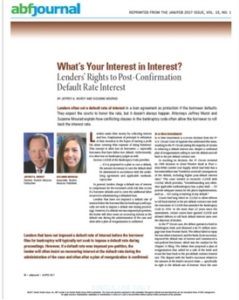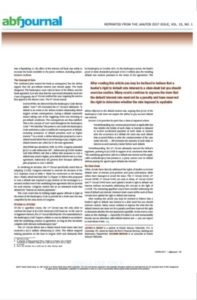Is an account debtor that is a unit of a state government that received notification under UCC 9-406 to make payment to a factor obligated to honor such notification? 9-109 of the UCC addresses the Scope of Article 9. It provides: “[t]his chapter does not apply to … [a]ny transfer by a government or governmental unit.” A Florida appellate court just addressed that issue. Read on to see how it turned out.
The most basic principle in commercial finance law is the right to place account debtors on notice and to rely on the effectiveness of such notice. Account debtors that fail to abide by the notification remain obligated to the assignee of the account- the secured party.
In the Florida case the debtor provided roadside assistance to the Florida Department of Transportation. The factor provided the Department with notification that the debtor’s accounts had been assigned to the factor and that all future payments should be made to the factor. The notification stated that payment to any other party would not discharge the Department’s obligations on the accounts.
9-406 provides in part:
“[A]n account debtor on an account, chattel paper, or a payment intangible may discharge its obligation by paying the assignor until, but not after, the account debtor receives a notification, authenticated by the assignor or the assignee, that the amount due or to become due has been assigned and that payment is to be made to the assignee. After receipt of the notification, the account debtor may discharge its obligation by paying the assignee and may not discharge the obligation by paying the assignor.”
Although it received the notices, the Department nonetheless continued to pay the debtor and refused to pay the factor. The Department claimed that governmental account debtors were outside the reach of 9-406. It noted that 9-109(4)(n) provided: “[t]his chapter does not apply to … [a]ny transfer by a government or governmental unit.”
The Department argued that because its payments on the accounts receivable involved transfers of money by a governmental unit, the so-called government-transfer exception in 9-109(4)(n) prevented 9-406 from regulating how it may discharge its contractual obligation for the services rendered to it by the debtor.
The court noted that if the provisions of 9-406 could be read to “apply to” a “transfer” by a governmental unit where the governmental unit was merely an account debtor making a payment to the assignee of an account receivable rather than the assignor of that account, then the Department’s argument would be correct. But, the court explained that the plain language of section 9-109 excluded this construction.
The court went on to consider whether an account debtor’s payments on accounts receivable in accord with 9-406 are transfers to which Article 9 is being applied. Put differently, the question was whether an account debtor’s payments on accounts receivable are objects of 9-406.
The court determined that the statutory text showed that the transfer to which the statute applies—the transfer that is the object of the statute—is a transfer of accounts, chattel paper, or payment intangibles and not a transfer of money as payment to satisfy an account debtor’s obligation on one of those items.
The court concluded that the government-transfer exception created by section 9-109(4)(n) “by its own terms, is not implicated by the mere fact that the government happens to be an account debtor required to make a payment on an account, chattel paper, or payment intangible that has been assigned.”
The court went on to note that it would have reached a different conclusion had the government sold such assets:
“Article 9 generally applies to such sales, and the sale of an account, chattel paper, or payment intangible by a governmental body would be a transfer of that asset, which would be a transfer by a governmental unit within the meaning of [9-109(4)(n)]. That circumstance, however, is not what the facts of this case present. Here, the accounts receivable were sold [to the factor], and the Department, as the governmental account debtor, was owed notice of the sale under the statute for the purpose of sending the same payments it always owed. The text of [9-406] shows that its object—the thing it applies to—is the assignment of accounts, chattel paper, and payment intangibles. In this case, that occurred through a sale of accounts receivable by a nongovernmental entity, not the payment on those accounts by a governmental one.”
Conclusion — factor wins and the Department was subject to a double pay.
Assignees of state government receivables can take comfort in this ruling as it protects the integrity of their 9-406 (and 9-607) notifications to state government divisions.
CAVEAT: Do not confuse this ruling concerning notification to a state government with notification to a federal governmental unit which is covered by the Federal Assignment of Claims Act which, although can achieve the same result, is a bit more technical and cumbersome in effecting notification.


